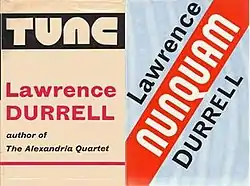 First UK editions | |
| Author | Lawrence Durrell |
|---|---|
| Original title | Tunc and Nunquam |
| Country | United Kingdom |
| Language | English |
| Series | The Revolt of Aphrodite |
| Publisher | Faber and Faber (UK) Viking (US) |
Publication date | 1974 |
| Media type | Print (Hardback & Paperback) |
| Preceded by | The Alexandria Quartet |
| Followed by | Monsieur |
The Revolt of Aphrodite consists of two novels by British writer Lawrence Durrell, published in 1968 and 1970. The individual volumes, Tunc and Nunquam, were less successful than his earlier The Alexandria Quartet, in part because they deviate significantly from his earlier style and because they approach more openly political and ideological problems.
Critical responses to the work has varied. Several contemporary critics dismissed Durrell's works at the time, but current scholarship is examining the many ways in which The Revolt of Aphrodite fits into a genre of dystopic fiction.
The two novels are:
- Tunc (1968)
- Nunquam (1970)
The protagonist, Felix Charlock, finds himself increasingly tied to the multinational corporation Merlins, which is most often simply called The Firm. He is both contractually and maritally tied to the Firm. His rebellion and attempt to escape leads to the death of his son and his own incarceration in a mental asylum. His lover at the beginning of the novel, Iolanthe, is likewise captured by the Firm through its net of contracts and capitalist acquisitions, ultimately leading to her death. In the second half of the work, Nunquam, Iolanthe is resurrected as a robot, which ultimately destroys itself along with the director of the Firm, Julian. The novel ends with the burning of the Firm's contracts, but no one knows if this will cause any change.
The novels are densely allusive[1] and reflect the political tensions of the May 1968 general strike in Paris.[2] They also address the same theme of multiplicity and contingency Durrell developed in The Alexandria Quartet, often in a way that shows Durrell's interest in Nietzsche:[3]
'Haven't you noticed Charlock that most things in life happen just outside one's range of vision? One has to see them out of the corner of one's eye. And any one thing could be the effect of any number of others? I mean there seem to be always a dozen perfectly appropriate explanations to every phenomenon. That is what makes our reasoning minds so unsatisfactory; and yet, they are all we've got, this shabby piece of equipment'.[4]
A similar preoccupation with narrative and "cause and effect" is introduced early in the series, and this is made explicit by the character Hippolyta: "There seems to be a hundred reasons to account for every act. Finally one hesitates to ascribe any one of them to the act. Life gets more and more mysterious, not less."[5]
References
- ↑ Mulvihill, James (2000). "Conrad's Accountant and Durrell's Tunc". Notes on Contemporary Literature. vol. 30, no. 3: pp. 11–12.
- ↑ Kaczvinsky, Donald (2002). "Durrell and the Political Unrest: Paris, May 1968". In-Between: Essays and Studies in Literary Criticism. vol. 11, no. 2: pp. 171–79.
- ↑ Gifford, James (2003). "Durrell's Revolt of Aphrodite: Nietzschean Influences". Mosaic: A Journal For the Interdisciplinary Study of Literature. vol. 36, no. 2: pp. 111–127.
- ↑ Durrell, Lawrence (1968). Tunc. Faber and Faber. p. 100.
- ↑ Durrell, Lawrence (1968). Tunc. Faber and Faber. p. 230.
External links
- The Literary Encyclopedia, Tunc
- Review of Nunquam by Simon McLeish
- The International Lawrence Durrell Society Official website of ILDS